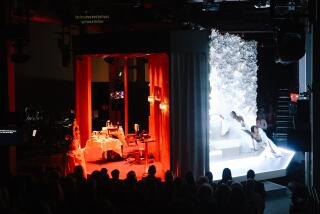STAGE REVIEW : Play-It-Straight ‘Verona’ Needs a Gimmick at Grove
- Share via
It’s easy to understand the language of “The Two Gentlemen of Verona” at the Grove Shakespeare Festival; it’s well-spoken American Shakespeare. But it’s harder to figure out why the Grove, which has hardly exhausted the entire Shakespearean repertoire, is offering its second “Verona” in six years.
This early play isn’t Shakespeare’s finest. At the Grove, it produces a modicum of merriment early on, but it wears out its welcome shortly after intermission.
And it ends with one of Shakespeare’s clumsiest denouements. Proteus, a skunk who has just been caught attempting to rape his best friend’s intended, is immediately forgiven by all of the eyewitnesses--including the friend, the intended, and Proteus’ former girlfriend, who still hopes to marry the two-timer.
This turn of events cries out for a strong directorial concept. Shakespeare needs help here, if we’re to comprehend such unlikely behavior. Or, if efforts to explain the ending fail, the director should distract us from it.
In a Times interview, this production’s director Victor Pappas said he considered updating “Verona” to the 1970s. It sounds as if he had a sort of “Sexual Perversity in Verona” in mind--not a bad idea. But he ultimately rejected that route, fretting that most updates are “too gimmicky” or that they subvert “Shakespeare’s original intent.”
Well, “Verona” needs subverting. With this play (to borrow a phrase from those distinguished dramaturges, the strippers in “Gypsy”), you gotta have a gimmick.
Instead, Pappas played it straight. “Verona” is “a very serious story with purposeful comments about the nature of love, relationships and friendship,” he told The Times. He promised a “slower, more deliberate” tempo for his staging, and a focus on the vanity and selfishness of Proteus.
This approach yields an occasional stageworthy moment. A monologue in which Proteus tries to justify his betrayal of his friend becomes a primping session; as he speaks the words, “I to myself am dearer than a friend,” three valets hoist mirrors up so he can see just how dear he is from all directions.
But even this scene is somewhat restrained. Proteus’ clothes aren’t notably more reflective of his narcissism than those of his friend Valentine. (Anne Bruice did the costumes.) And actor David Chemel seems hesitant to flesh out the view of Proteus that Pappas is trying to project.
Chemel’s Proteus doesn’t turn the corner sharply enough from lovesick kid to scheming cad. It’s not a protean performance. His indecisive rendition of “Who Is Silvia?” (music by Chuck Estes) is symptomatic of this, and it’s one of the elements that slows down the second act.
David Anthony Smith fares somewhat better in the simpler role of Valentine, the dashing (and rather dim) hero. Kerry Noonan is strong and stalwart as Valentine’s love, Silvia.
Susan Doupe makes Julia, the girl back home whom Proteus scorns, shrill and girlish. It makes sense at first, helping us understand how Proteus can ignore his pledges of love at the first opportunity. It makes less sense when Julia dresses up as a boy and spies on Proteus. A convincing boy Doupe is not.
The servants here are successfully individuated. Valentine’s page Speed (Brian Hickman) is foppish, Proteus’ servant Launce (Harry Woolf) is lumpish, Julia’s Lucetta (Emilie Talbot) is smartly acerbic. These three, plus the pooch (Shadow) who accompanies Launce, generate most of the evening’s titters. Rick Tigert’s Thurio, a third rival for Silvia’s hand, helps illustrate Pappas’ point about vanity.
But Thurio and the servants do nothing to prove Pappas’ thesis about how serious this play is. Nor does the conventionally pretty set, designed by Stan Mayer and lit by David Palmer. The fact is that this “Verona” doesn’t have the substance of which Pappas spoke, nor is it as raucously entertaining as it can be when directors ham it up.
At 12852 Main St., Garden Grove, Thursdays through Sundays at 8:30 p.m., through Sept. 16. Tickets: $10-$23; (714) 636-7213.
More to Read
The biggest entertainment stories
Get our big stories about Hollywood, film, television, music, arts, culture and more right in your inbox as soon as they publish.
You may occasionally receive promotional content from the Los Angeles Times.










